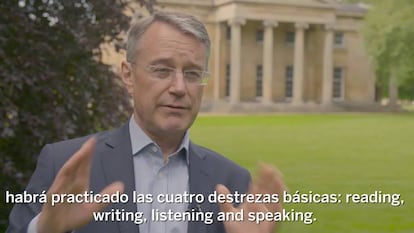The Cambridge English exam: to sit or not to sit?
When it comes to learning English, expert opinion varies on the benefits of focusing on a qualification


Spaniards admit to a serious problem with the English language. Only 19% of them consider their level to be “very good”, according to statistics from Eurostat. So who makes up this 19%? Those who study simply to improve their fluency, or those who choose courses that will prepare them for official exams such as those run by Cambridge English, part of the University of Cambridge, and that has been providing English languge qualifications for the last century.
There is no conclusive evidence to show students learn better with one approach or another, while the experts fail to agree on the matter. Some argue it is more effective to focus on the short or medium-term challenge of Cambridge's First Certificate, Advanced Certificate and Proficiency since, apart from anything else, they offer practice in the four fundamental skills of reading, listening, writing and speaking.
On the other hand, some language experts argue that focusing solely on passing exams limits teachers' creativity and freedom, reducing learning to something purely mechanical.
Exam classes don't take into account students’ personal interests or strengths and weaknesses and the four skills are given an equal amount of attention
Carmen Muñoz, Professor of English Linguistics at the University of Barcelona and a specialist in the acquisition of a second language, believes that there are pros and cons to obtaining an official qualification. “The upside is that the exam helps you gauge your level and what you still need to do to reach your goal,” she explains.
The downside, according to Muñoz, is that exam classes don't take into account students’ personal interests or strengths and weaknesses. The four skills are given an equal amount of attention, whether or not the students need to focus more on one thing or another. “These exams have been devised to provide a standard measure for language skills,” according to the Common European Framework of References for Languages. “In this era of personalized education, what is needed are programs tailored to the individual.”
She says Barcelona University has just launched what it calls ‘need analysis’, a test that assesses students’ needs and then designs courses accordingly.
Meanwhile, Cambridge English argues that behind their exams – sat by five million people in 170 countries every year – is a team of more than 700 people engaged in research and assessment.
“The exams’ structure is revised every 10 years,” says Belinda Cerdá, Director of Assessment at Cambridge English in Spain and Portugal. “And changes in society are taken into account.”
For example, letter writing has been replaced by essays, in which the candidate expresses his or her ideas on a specific subject, according to the demands of the job market.
If you think about the most important things you have learned in your life they are probably not related to an exam: the same thing should happen with English María Luisa García of the faculty of Education at Madrid’s Complutense University
Cerdá, who has been preparing students for the Cambridge exams for more than 10 years, believes that signing up for an English course without an exam shows a lack of focus. “My students always say preparing for a specific exam is more serious than studying for the sake of it. Even if they didn’t want to pay for the qualification, they like the wealth and variety of Cambridge's materials,” she says. “A lot of people think the exams are just multiple-choice but they go way beyond that; you have to produce language and develop ideas.”
Román Álavarez, Professor of English Studies at Salamanca University and who has been in charge of Cambridge exams there for the past 25 years, always recommends his students take the exams. “Learning with the aim of getting the qualification is much more practical,” he says. “Students are more motivated and kill two birds with one stone.” He highlights Cambridge English's 100 years track record and its internationally tried and tested method.
Little more than a money-spinner?
In 2013, two lecturers from the University of Navarre interviewed a group of primary teachers from state and state-subsidized schools in the region to find out what impact Cambridge exams had on their teaching methods.
Most of those interviewed said that preparing for these exams had enabled them to dedicate more time to oral skills and also to change their assessment criteria. In oral exams, examiners no longer penalize grammatical as long as a student is able to communicate effectively. Other aspects they appreciated included the quality of the materials provided by Cambridge English, among them the range of voices and accents when it came to listening.
Some English teachers complain about the mechanical aspects exam-focused language learning
But there were also criticisms, including the price of the exams, which ranges from €50 for the Young Learner’s exam to €217 for Proficiency. Other state-school teachers say Cambridge English is an imposition and little more than a money-spinner.
Among university lecturers unimpressed by Cambridge's exam-focused approach is María Luisa García of the faculty of Education at Madrid’s Complutense University, who also complains about the mechanical aspects of this kind of learning, while noting that her students’ oral skills have become stronger than their writing skills over the past 15 years.
García believes that Spain’s rigid system of learning Spanish, with its emphasis on syntax and grammar, is reproduced in English classes. “If you think about the most important things you have learned in your life they are probably not related to an exam,” she says. “The same thing should happen with English.”
Bernadette Maguire, an adviser in the Examinations Department of The British Council, Spain, says that language students need to manage their expectations: “Whether there is an exam or not, short-term learning is not possible,” she says, adding that in other words, you get out what you put in.
Sign up for our newsletter
EL PAÍS English Edition has launched a weekly newsletter. Sign up today to receive a selection of our best stories in your inbox every Saturday morning. For full details about how to subscribe, click here
English version by Heather Galloway.
Tu suscripción se está usando en otro dispositivo
¿Quieres añadir otro usuario a tu suscripción?
Si continúas leyendo en este dispositivo, no se podrá leer en el otro.
FlechaTu suscripción se está usando en otro dispositivo y solo puedes acceder a EL PAÍS desde un dispositivo a la vez.
Si quieres compartir tu cuenta, cambia tu suscripción a la modalidad Premium, así podrás añadir otro usuario. Cada uno accederá con su propia cuenta de email, lo que os permitirá personalizar vuestra experiencia en EL PAÍS.
¿Tienes una suscripción de empresa? Accede aquí para contratar más cuentas.
En el caso de no saber quién está usando tu cuenta, te recomendamos cambiar tu contraseña aquí.
Si decides continuar compartiendo tu cuenta, este mensaje se mostrará en tu dispositivo y en el de la otra persona que está usando tu cuenta de forma indefinida, afectando a tu experiencia de lectura. Puedes consultar aquí los términos y condiciones de la suscripción digital.








































